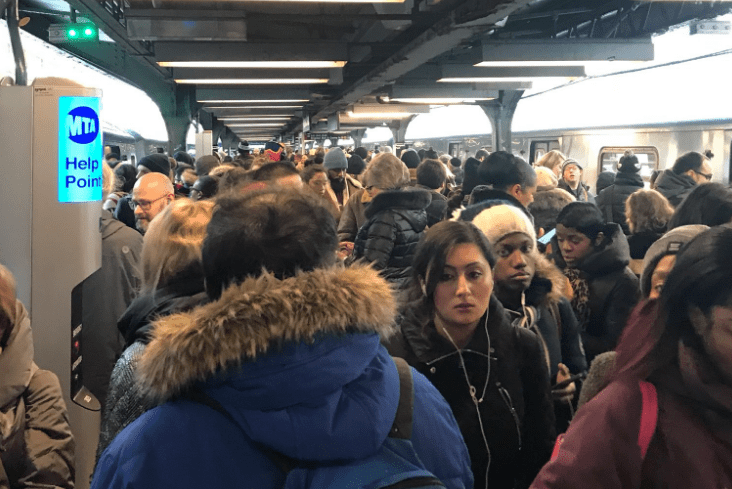People of color, the poor, and New York's hardest-working residents would be disproportionately affected by transit cuts if the MTA doesn't get a cash infusion fast, a new report reveals.
The state's transit authority has already presented a doomsday list of cuts it says it will be forced to implement if the GOP-controlled Senate and the Trump administration fail to provide emergency funding. But the MTA's list did not drill down to the specifics of who would be affected most, as a new report from TransitCenter does [PDF].
Overall, close to 200,000 households — roughly 555,000 people — would lose access to frequent full-day transit. And that doesn't just hurt workers; it hurts businesses. According to TransitCenter, "businesses would suffer as 184,911 jobs currently near frequent full-day transit lose that access."
But who will be most affected — why, the poor, the hardest-working and people of color, of course, as the report shows:
- Black residents make up 16 percent of the region, but 20 percent of those who would lose access to frequent full-day service.
- Non-White and Hispanic residents make up 53 percent of the region, but 65 percent of those who would lose access to frequent full-day service.
- Second- and third-shift workers who rely on transit would face even more difficult commutes:
- Roughly 9,590 commuters who leave home between midnight and 5 a.m. would lose access to service that runs frequently 24-hours-a-day; so would 15,107 commuters who leave work between midnight and 5 a.m.
- Roughly 40,530 households without access to a car would lose access to frequent transit, imperiling their ability to meet essential needs.
The analysis is based on proposed 50-percent cuts in service frequency during peak hours and 30 percent during off-peak hours.
The report comes as the federal government has repeatedly stalled over another round of emergency funding for the MTA and transit agencies nationwide. In July, the MTA exhausted all of the $3.7 billion that federal authorities allocated early in the pandemic under the CARES Act. Ridership has slowly started to inch back, but revenue shortfalls from fares and tolls will rob the MTA of the agency of an estimated $5.1 billion this year alone.
Overall, the agency is facing a $16-billion overall budget gap.
"Our analysis shows [transit cuts] would have profound impacts,” said TransitCenter Director of Research Steven Higashide. "Millions of people would lose access to high-quality transit near their home and workplace. Late-night commuters trying to get to essential jobs would be stranded. And, as has happened so often in this pandemic, the blow would fall most heavily on Black riders and communities of color.”
Riders Alliance, which is working with TransitCenter to distribute the report, offered a plaintiff appeal from a pharmacist who works on the Lower East Side, but lives in Queens.
“My commute has never been easy,” said Suk-Yee Wong. “If Congress doesn’t rescue transit, then it will become even longer and more unreliable. I also worry that my patients will have problems accessing care, particularly those who depend on paratransit to see their doctors and receive physical therapy. These patients do not have the means to call an Uber."
Meanwhile, the federal logjam may be about to break as House Democrats apparently are negotiating with the Trump administration on a smaller relief bill that may include some transit funding. Neither the Washington Post story nor the House Democrats' own press release mentioned transit, but the transit news is buried on pages 12 and 13 in a longer bill summary here.
It would allocate $32 billion in "transit emergency relief," plus $2.4 billion to support Amtrak in the Northeast Corridor and elsewhere.
MTA CEO Pat Foye applauded the bill.
“We applaud Speaker Nancy Pelosi and House Democrats for including $32 billion desperately-needed relief for mass transit we’ve been advocating for in the new version of the HEROES Act," Foye said in a statement. "I also want to thank the bipartisan New York delegation for their hard work and steadfast support.
“It’s a fact that mass transit systems across the country move local economies forward and this aid will help power the nation’s recovery. We urge Senate Republicans to pass this legislation quickly — and the President to sign it. Public transit systems simply can’t afford anything less. There is no time to waste — the jobs of millions of Americans depend on it.”
Read the full, national report below or linked here:






